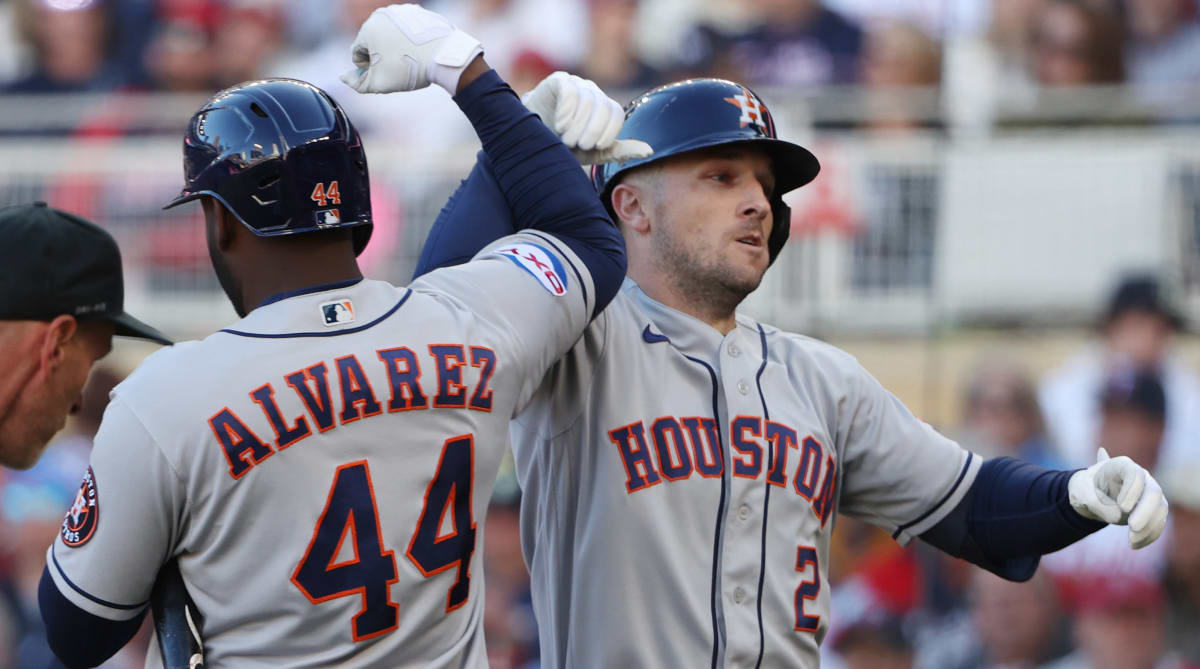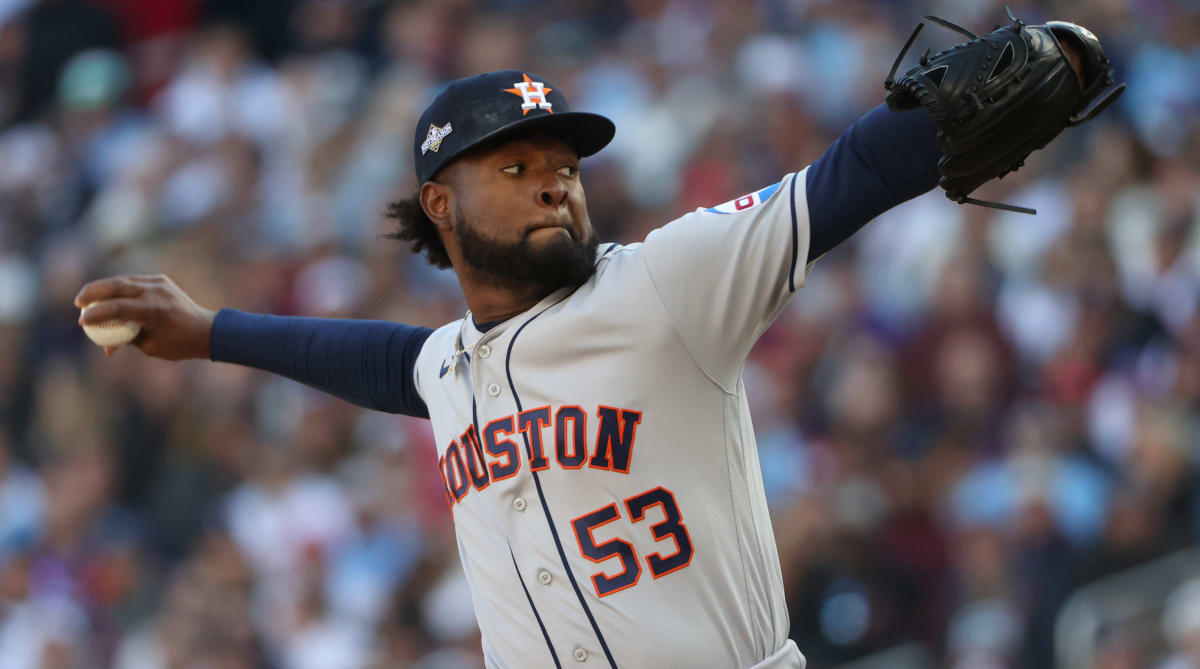You fire up Netflix. One of those silent teasers for a show pops up on the screen.
“The Unstoppables.”
“Slow Burn ... Suspenseful ... Gritty.”
You click on it. You read the show description.
“A tight-knit and some would say notorious band of brothers reunites to make another run at pulling off the heist of a Tiffany & Co. heirloom. The challenges are new, but the cast and the overriding question are familiar: ‘Can anybody stop these guys?’”
Sounds interesting. You click on the latest episode.
“Season Seven. Episode Three: The guys go into hostile territory to face Sonny, one of the baddest gunslingers in the land. Can they make it out without ending up on the brink of disaster?”
You press play. Then you catch yourself laughing at the very brief moment of suspense that came over you.
You laugh because you know how this is going to turn out.
And you were right.

Jesse Johnson/USA Today Sports
The Astros crushed Sonny Gray and the Twins, 9–1, Tuesday in Game 3 of the American League Division Series, which also happened to be a classic case of typecasting. Yordan Alvarez (two doubles and a fourth homer in three games) continues to treat postseason baseball as if it were batting practice. Martin Maldonado continues to be the Professor Albus Dumbledore of catchers. Jeremy Peña is a wizard with leather. Cristian Javier is El Reptile who sweats trouble about as often as he gives up hits, which is just about never. Jose Altuve, Alex Bregman and Kyle Tucker have the knack of stuntmen able to pull off the most impossible scenes unscathed.
And a newcomer to the cast, Jose Abreu, becomes a true Astro by finding his lost superpowers in October. In his spotlight episode, it means Abreu crushes two homers of at least 440 feet—after hitting just one such bomb the entire year. Of course.
José Abreu got all of this one! 😯
— MLB (@MLB) October 10, 2023
The @Astros are up 4-0 in the 1st inning. #Postseason pic.twitter.com/8YWkhEjaoD
Back when the Blue Jays won the World Series in 1992, Toronto DH Dave Winfield said holding back that lineup was like trying to hold back water with your hands. It’s the same with this Houston team. You may succeed in part, but not well enough.
The Astros are one win away from going back to the American League Championship Series for a seventh straight time. Since Houston was swept at home by the Royals on the penultimate weekend of this season, leaving even a spot in the postseason in doubt, the Astros are 7–2 against the Mariners, Diamondbacks and Twins, including 6–1 on the road.
How do you explain the annual forward inertia of this team at this time of year? They win the all-important postseason wars of hitting more home runs (8–3) and striking out less (27–38) than their opponent. But another good place to start is Dumbledore. Professor Albus Maldonado has started every one of these nine games with the season on the brink.
Now, Maldonado is not known for his bat. He is a career .207 hitter over more than 3,800 plate appearances. Nobody in baseball history has been given that much playing time while hitting so poorly. He displaced another catcher, Billy Sullivan (.213), who was born in 1875 and was the catching Dumbledore of the deadball era. Sullivan once caught three balls dropped from the top of the Washington Monument that were estimated to be traveling about 160 miles per hour. When someone suggested he move on to trying to catch a bullet dropped from an airplane, Sully declined. Smart man with good hands and a good head.
The playing time-to-batting average distinction for Maldonado happens to be a great compliment. It means he is so valuable behind the plate that teams happily keep writing his name in the lineup, especially Houston manager Dusty Baker. Poor Dusty has taken grief for not giving more time to slugging rookie Yainer Díaz, but Díaz isn’t ready to call and run major league games. And for the people who clamored for his bat, Diaz did get a start as a DH in Game 3 (shockingly, over hitting pro Michael Brantley) and went 0-for-5 with four punchouts.
Maldonado had a sacrifice bunt and two hits, including one impressive rip to set up a run that was not a hit-and-run single but a run-and-hit single as Pena took off on a steal attempt.
But it was Maldonado’s usual wisdom from his observation perch behind the dish that most influenced the game. With two on and no outs in the third inning, for instance, Maldonado called time and ambled to see Javier on the mound with his usual deflective calm that borders on the drudgery of taking out the trash. The fans at Target Field, having already tried to fluster Javier with counting down the pitch timer, were rising in noise and hope with their team down 4–0. The Twins’ 2–3–4 hitters were coming up: Jorge Polanco, Max Kepler and Royce Lewis.
“I just went out there to make sure he took his time and that we slowed things down,” Maldonado says. “Just think pitch by pitch. That’s all you can do. That’s all I reminded him.”
Maldonado had no worries about how El Reptile would handle the tense situation. He admitted, though, he once did.
“He came up in 2020 with no fans in the stands,” Maldonado says. “The next year I thought, Uh-oh. Will he be like this with fans in the stands? You know what? Nothing changed. He never changes. He’s the same guy. He’s like that on the mound, he’s like that in the clubhouse.
“The only way you could get a reaction from him is to punch him, I guess.”
Maldonado trudged back behind the plate and started pushing buttons to call pitches. Javier did what he always does: he nodded and threw the pitch Dumbledore wanted.
“Always,” Maldonado says. “He always follows me.”

Jesse Johnson/USA Today Sports
Maldonado started each of the next three hitters with breaking pitches to get ahead. Javier retired all three: Polanco on a fastball for a strikeout, Kepler on a fastball for a flyout and Lewis on a slider for a strikeout.
Two innings later, Maldonado pulled Javier through another jam, getting Kepler and Lewis on strikeouts to leave the bases loaded. Thanks to Maldonado’s game-calling, Javier threw 37% sliders, his second-highest rate this year. The Twins swung 16 times at his slider and missed 13 of them.
“We didn’t plan on that,” Maldonado says of the bevy of spin. “It was a matter of seeing what was working and riding it. The key was Javy was throwing his breaking ball for strikes. When he does that, he’s as good as any pitcher in the game.”
Talk about cold-blooded: in his past three postseason starts, El Reptile has faced 61 hitters and given up two hits and no runs.
Cristian Javier of the @astros has now allowed 1 hit or fewer in each of his first 3 career postseason starts.
— OptaSTATS (@OptaSTATS) October 10, 2023
No other pitcher in MLB history has had 3 such starts over his entire postseason career (consecutive or not). pic.twitter.com/fFEfXD0g9N
Run support helps. Alvarez is a hitting genius who can sniff out what pitchers are trying to do to him, which if they were smart this time of year would be to not throw him a strike. But if Abreu is going to keep hitting like he has done since September, this lineup is a nightmare for managers to strategize against. Walk Alvarez? Sure, but then you get Tucker and the re-awakened Abreu, a former MVP.
The Astros do subtlety well, too. Pena provided the defensive gem of the game that will reverberate into Game 4 Wednesday. The Twins had runners at first and second with one out in the sixth and their first vibe of true momentum after a run-scoring single by Willi Castro. Ryan Jeffers smoked a ball 110.7 mph, the hardest hit ball of the game other than Alvarez’s home run. It should have been an RBI single that cut the score to 6–2 with the lineup turning over, the crowd going bonkers and Baker taking a shaky Hunter Brown out of the game in favor of his best troubleshooting reliever, Bryan Abreu, to get as many as five outs.
Instead, Pena dove to his left, smothered the ball, made a sweet quarterback-option style backhand shovel to Altuve, who whirled and completed the double play. The Twins never got another hit. The Astros never stopped hitting.
Abreu did relieve Brown the next inning but he threw only a dozen pitches before Baker got him out of the game as the Astros added more runs. Pena’s play was most important for this reason: instead of burning Abreu for five outs in Game 3, leaving his use questionable for Game 4, Baker has Abreu available for multiple innings in a clinching situation. Abreu and closer Ryan Pressly can be called on for nine outs. That leaves 18 outs to be divided among Jose Urquidy, Phil Maton and Ryne Stanek.
The Twins will start with Joe Ryan, with manager Rocco Baldelli ready with a quick hook and a conga line of relievers in an elimination game. Edge: Houston.
Since 2017, the Astros have played regular season baseball at a .611 clip. Only the Dodgers (.641) have been better. But in these same seven years, the Astros have played postseason baseball at a .618 clip—over 89 games. They play even better against the best teams in the most pressure.
The Astros are not into the ALCS yet. Drama lurks. If the Twins can get an early lead at home, they can ride the momentum of their home crowd; a three-run first-inning blast by Abreu killed the Game 3 party before it started as Gray oddly kept leaving his sweeper in the middle of the zone. But if you’re a fan of The Unstoppables, and you’re seven seasons into binge-watching the best show in October, you can’t be blamed if you think you know how the next episode plays out.
Spoiler alert: in potential clinching games in this seven-year run, the Astros are 13–10, including five straight wins by a combined score of 26–7.







